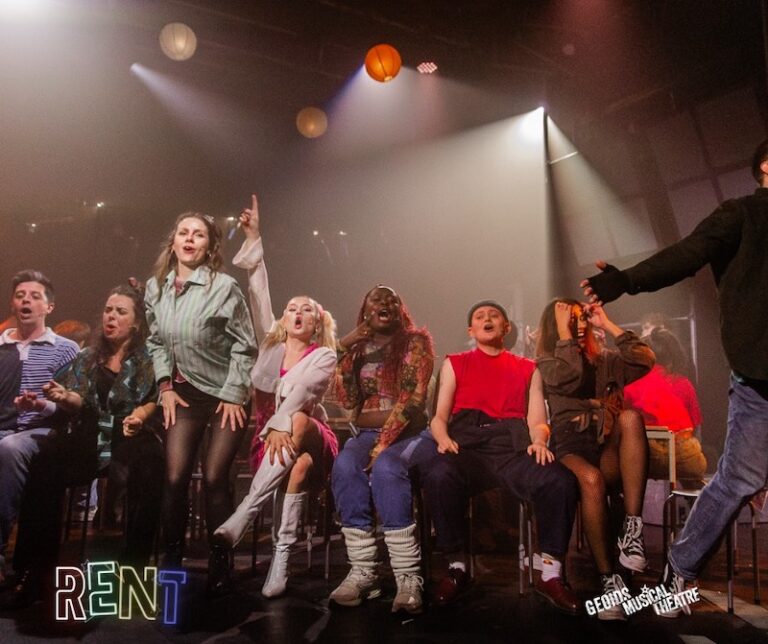Book, Music, & Lyrics: Jonathan Larson
Original Concept & Additional Lyrics: Billy Aronson
Director: Luke Renwick
Musical Director: Amy Foden-Lloyd
When Rent emerged in 1996, it was considered groundbreaking. Its blend of rock music, gritty aesthetic, and social commentary set it wildly apart from the spectacle-laden musicals of the time. The energy and excitement it brought to musical theatre catapulted it to huge success, but time has enabled this show to be reevaluated away from the hype and hyperbole.
Based on Puccini’s La Bohème, Rent follows a year in the lives of struggling artists and friends in New York’s Lower East Side during the height of the AIDS crisis. These impoverished young people – a filmmaker, musician, performance artist, and others – grapple with poverty, illness, loss, and the gentrification threatening their bohemian community.
It’s a bold and dramatic canvas that, away from the initial excitement, is significantly less than the sum of its parts. The score, aside from a handful of standout numbers, feels like generic rock fodder, lacking the melodic depth to sustain emotional engagement. More problematic is the narrative structure: too many storylines vie for attention, robbing each of necessary depth. The show lurches from one vignette to another with no bridging or flow, making it impossible to invest in any single character’s journey. The rebelliousness, once electrifying, now feels dated and hollow, particularly when the supposedly impoverished Mark is revealed to hail from wealthy Scarsdale and attended Brown University, undermining any claim to authentic bohemian struggle.
In this production, raw energy is on display in abundance, with the ensemble throwing themselves wholeheartedly into their roles. What emerges, however, is style over substance, as bombastic performances further distance the audience from any narrative cohesion. The fundamental problem is comprehension. In a musical where songs drive the narrative forward, lyrical clarity is essential, and here, that crucial component is severely missing. Opening night technical issues with microphones cutting out and delayed sound cues only compound the problem, though even when the system functions, the muddied audio mix buries voices beneath the music. The score itself sits too far back in the mix, making the overall soundscape feel flat and lifeless rather than energised.
These production shortcomings do nothing to elevate Rent beyond the inherent weaknesses of its source material. Instead, they amplify them, resulting in a confusing calamity that leaves audiences scratching their heads.
It’s a real shame, as there’s genuine talent on display. Rob Kelly brings assurance to filmmaker Mark Cohen, Eleanor Rattenbury delivers a tantalising Mimi, and Nurin Abdul Aziz goes hell for leather in a possessed interpretation of performance artist Maureen. Luke Renwick directs with undeniable energy and makes full use of the space, but in doing so, compounds the narrative incoherence. Action jumps frantically from one section of the set to another, making it nearly impossible to follow the through-line, especially when the full ensemble is in flow.
This production lacks the emotional resonance necessary to justify Rent‘s legendary status. The overblown performances, problematic sound design, and disjointed staging transform what should be an intimate exploration of friendship and mortality into an exhausting exercise in confusion.
For fans of Rent, this provides an opportunity to see a show they love on stage again, and that’s something to welcome. For the uninitiated, you’ll likely leave wondering what all the fuss has been about.
Runs until 15 November 2025

